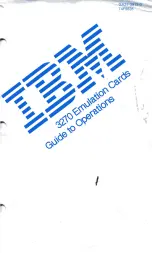
Introduction & Specifications
Product Overview
1-4
SpectraComm ADT
076R172-000
Installation and Operation Manual
Issue 6
Throughput Performance
Typical Throughput Conditions
It is expected that the traffic patterns of typical applications will be bursty in nature, thereby
allowing all sixteen or thirty-two async ports to deliver data without loss under typical traffic
conditions.
End-to-End Flow Control
The SC-ADT implements flow-control between the async end-devices to avoid buffer overflow and
data loss during extreme traffic conditions. End devices that respond to hardware/software flow
control will hold-off data transmissions to avoid traffic loss.
Worst-case Throughput Conditions
During extreme traffic conditions, the SC-ADT will handle an aggregate rate of 800,000 bits per
second, full duplex. This translates to 50,000 bits per second per port if using sixteen async ports
and 25,000 bits per second per port if using thirty-two async ports.
Note
Extreme traffic conditions are defined as continuous async data (i.e. “non-bursty”) with end-to-end flow-
control required.
Diagnostic Tests
SC-ADT supports the following diagnostics which can assist in isolating network problems.
•
Generates/answers pings
•
Tests Contact States
•
Loopbacks on Async ports
•
Transmit and Receive packet counts on Ethernet interface
•
Transmit and Receive byte counts on Ethernet interface
•
Transmit and Receive character counts on Async ports
Diagnostic Tools
•
SC-ADT supports the standard traceroute application which is used to determine the path an IP
packet follows through the network. It is a useful tool for diagnosing IP connectivity problems.
Traceroute is invoked by the
trace-rte
command.
•
System messages (SYS MSG) are useful in debugging failures. The last 100 system
messages can be viewed with the
show log sysmsg
command.
•
Network Statistics displays information about the current TCP socket connections, such as the
local or remote IP address, send and recieve window sizes, state, etc. To show the Network
Statistics, type:
show netstat
.
SNMP Traps
SC-ADT can generate SNMP traps on various events, and employs a reliable method for sending
them to as many as four trap hosts. By storing traps and verifying connectivity before sending, trap
delivery is greatly improved in the event of temporary network outages. Supported traps are:
•
Cold Start trap
•
LinkUp/Down traps for ethernet0
•
Link Up/Down traps for modem0 and modem1 (if so equipped)
•
Contact Sense trap for Start/Stop; Contact Sense trap for Active/Clear
•
ACL Violation trap; Port Alert trap
















































